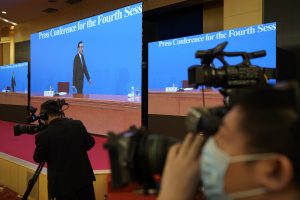In early March, China made a surprising announcement to cancel the traditional press conference by the premier – currently Li Qiang – scheduled at the end of its annual legislative gatherings. According to the government spokesperson, the legislature will not schedule the premier press conference during the rest of this congressional term, which lasts through 2027.
The announcement was another sign of the increasing authoritarian politics within China since its top leadership decided to amend the country’s constitution in 2018.
First introduced in 1988, the premier’s press conference was one of the few moments when journalists could directly speak to one of China’s top leaders. Chinese premiers had regularly attended the annual press conference since 1993, with the last one held last year in 2023.
The content of the annual press conferences largely stuck to pre-determined questions and scripted replies. However, the events offered rare moments for various Chinese premiers to show personal charisma and occasionally even highlight issues outside of the Chinese state propaganda. For journalists covering China, these conferences were also a rare opportunity to ask questions deemed sensitive within the Chinese political system.
For example, in the 2012 press conference, former Chinese Premier Wen Jiabao spoke about the necessity of continuing political reforms: “Now the reforms are in a critical stage. Without the success of political reforms, economic system reforms will not be complete,” the outgoing Wen warned. “The progress we have made could be lost again. New issues from society would not be addressed thoroughly. Historic tragedies like the Cultural Revolution could still happen again. Every responsible cadre member and leadership team member should feel the stress.”
In 2020, the late Chinese Premier Li Keqiang revealed that 600 million Chinese citizens have a monthly income lower than 1,000 yuan: “China is a developing country with a great number of population. The average annual income in our country is 30,000 yuan, but there are 600 million people with merely a monthly income of 1,000 yuan. In a medium-sized city, [an income of] 1,000 yuan is probably difficult to rent a place to live.”
Defying propaganda lines, the two former premiers used their press conferences to reveal critical issues within Chinese political and economic developments.
By axing the annual premier press conference, China’s government may also seek to weaken the importance of the premier and continue to centralize power in the hands of Chinese Communist Party General Secretary Xi Jinping. Xi abolished the term limits on the presidency – an office he also holds – in 2018 and is currently in his third term as both president and general secretary. The annual press conference was one of the very few times when Li Keqiang, China’s premier from 2013-2023, made headlines instead of Xi – at times because of a perceived gap between the two leaders.
The premier press conferences provided windows for the Chinese government to respond directly to critical and sensitive issues such as human rights, political reforms, and leadership changes. By canceling the event in the coming years, the Chinese top leadership team revealed its desire to govern the country in an even less transparent style, with less need to address public opinions. Together with a comprehensive censorship regime that combines technology and human efforts, the Chinese government will continue to operate in an environment with little accountability and opposition within its borders.
The cancellation came during a period of economic uncertainties and struggles. In the 1990s, the Chinese premier’s annual press conference was the limited opportunity the Chinese government offered to foreign press and media. In return, the government sought to use the press conference to attract investments and promote international trade.
While the Chinese government has vowed to attract and retain foreign investments in various meetings and public remarks, in practice the country’s top leadership team acts in ways that could impact business prospects. The Chinese leadership focuses more on political security than economic stability and attractiveness. It has become a systemic issue that the Chinese regime still neglects in its post-pandemic governing strategies.
Despite facing a weak post-COVID recovery, China’s leaders view political controls and safety as higher priorities. By scrapping the annual press conference, the Chinese leadership team prioritized shutting the door on any non-censored commentaries from the premier at the cost of sending a signal of openness that could bolster its economic numbers and prospects. With more and more political constraints ordered by China’s top leaders, there remain very few options that the country could utilize to address its economic struggles.

































